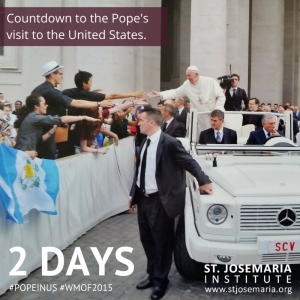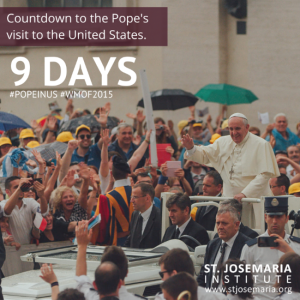
In the run up to Pope Francis’ North American trip there has of course been a lot of media coverage. You see in the mainstream media over and over again what a puzzle Pope Francis is. He’s a traditionalist on classic Church issues such as abortion, pro-family and euthanasia but he’s a progressive and a major critic of capitalism.
In particular I want to point you to two articles: A Pope for All Seasons (from today’s Washington Post) and Donald Trump vs. The Pope (from this week’s Maclean’s magazine).
Both articles circle around a main point in Pope Francis’ thought but neither identify it. I think it has to be named here. Pope Francis is for the human person. That is the main point of his pontificate. He wants to reach out to all human beings wherever they are and he wants to bring the joy of the gospel to them. This isn’t really that new a message among popes. Saint Pope John Paul II and Pope Emeritus Benedict XVI said similar things, but placed their comments of the context of doctrine. Pope Francis approaches the world in a pastoral style. Therefore communication is key and as can be seen from his reception it’s an area where the Holy Father shines.
Being Pro-Human Person Means Care for Our Common Home
Pope Francis’ pro-human person point of view probably is most clearly brought out in his last encyclical Laudato Si. That entire encyclical is written about the care that needs to be taken to create an environment in which human beings can flourish — not just in the sense of our physical environment, but the environment that other humans create around each other for us to grow as a global society.
If you see Pope Francis’ thought from that point of view, you’ll understand why he’s against anything that goes against the success of the human person.
Too Complex for A Story?
So why isn’t the media singling out Pope Francis’ pro-human person view-point in their media coverage? Well it’s a hard one to put into a story. It’s a bit abstract and it’s hard to nail down in a couple of thousand words. I’ve nailed it down in less that 300 but I’m assuming you have an idea of who Pope Francis is and what he’s done. To be fair, the Washington Post did include a list of 13 of the best books for understanding Pope Francis, but I think they left off the best one. It’s the shortest and the best one to prepare you for understanding the pope’s thought on this papal trip. It’s Pope Francis: The Keys to His Thought by Fr. Mariano Fazio.
I’ve written a review of it here. Fr. Fazio is the Vicar General of Opus Dei and has known Pope Francis since their days working together in Argentina. The book combines personal insights with excellent research and brevity. Give it a read and afterward you’ll have a better perspective on Pope Francis’ pro-human person view such as the video below. It’s from Rome Reports and gives an overview of the pope’s homily today in Havana where he explains (again emphasizing his pro-human person point of view) that we have to serve others and not ideologies.
